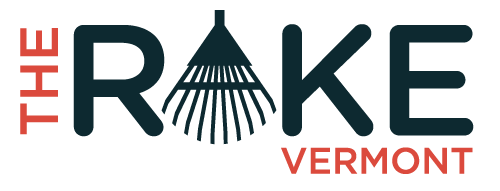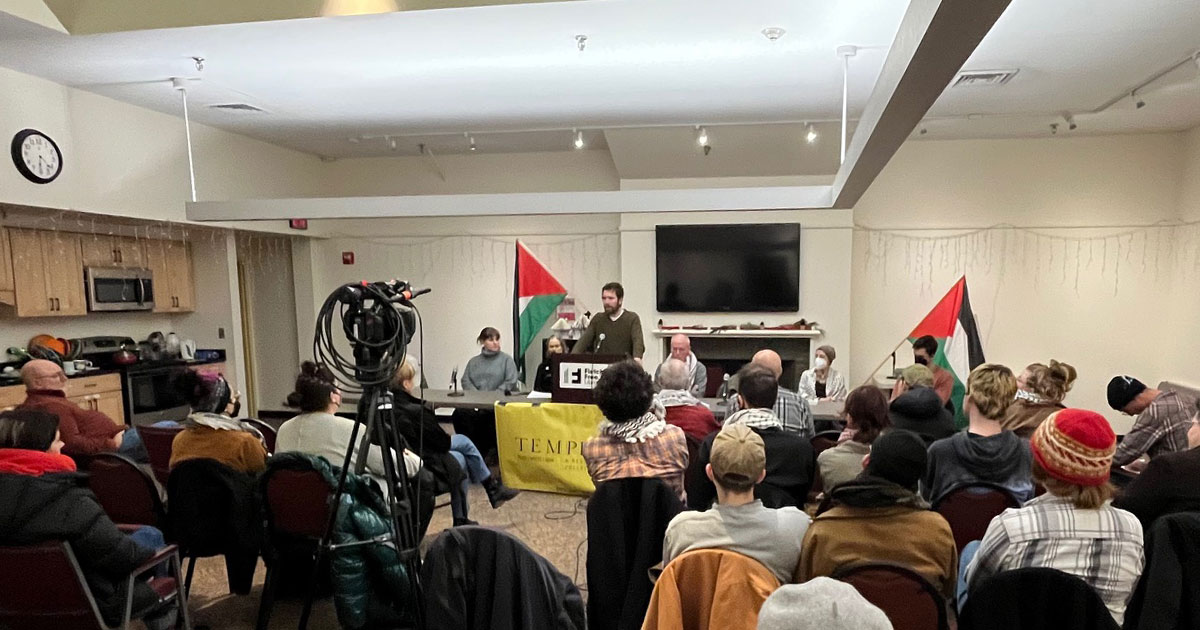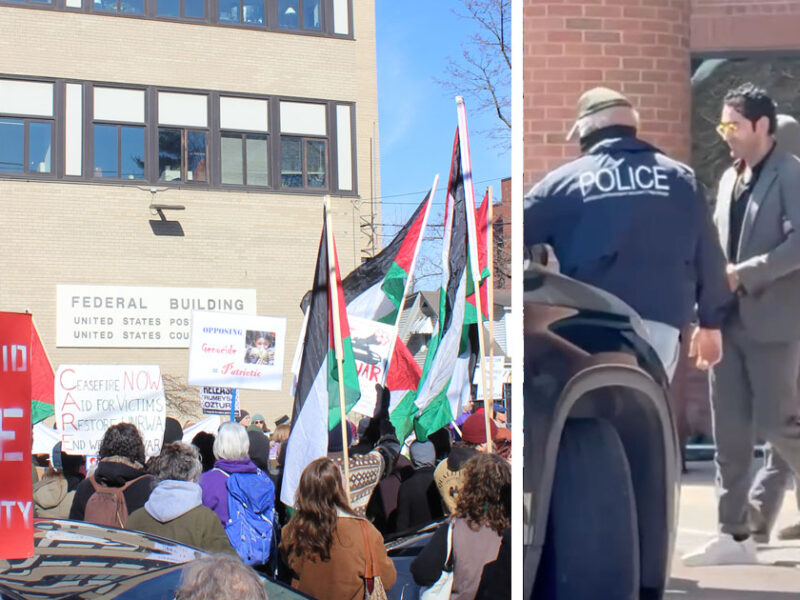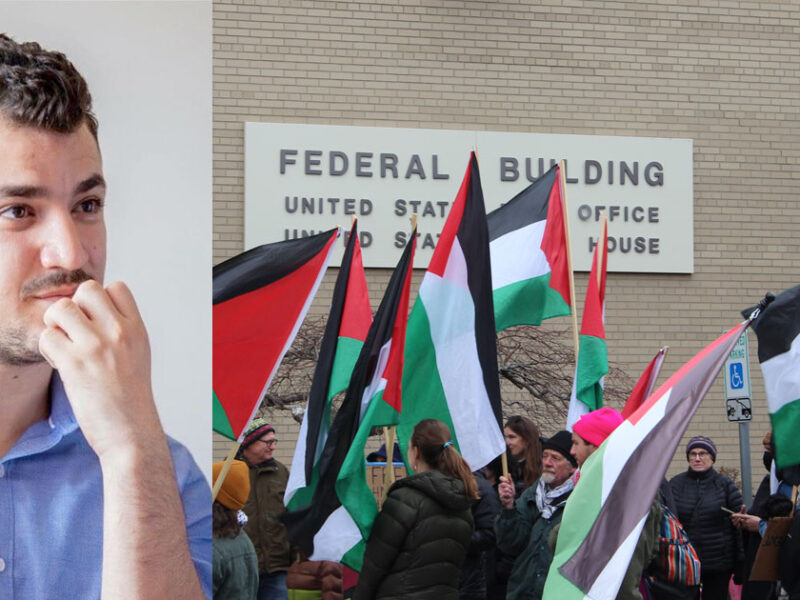In the aftermath of November’s presidential election, which will see former president Donald Trump return to office in January 2025, a renewed interest in organizing against the threat of a second Trump administration has prompted people to take action nationwide and locally. On Tuesday, at Burlington’s Fletcher Free Library, Vermont activist groups gathered to discuss their interconnected struggles and how to unite organizing efforts against the threats of the next four years.
Representatives from Migrant Justice, Southern Vermont for Palestine, FreeHer Vermont, and Howard Center Union AFSCME 1624, along with other activists, shared thoughts, discussed current action items locally, and provided an open space for those in attendance to offer additional insights and strategizing actions. The event was sponsored by the Vermont Tempest Collective.
While there was plenty of dialogue around the failures of the Democratic Party to meet the needs of working-class voters, their refusal to hold Israel accountable for its genocide of the Palestinian people, and a lack of viable electoral alternatives for voters, many pushed for organizing focused less on election outcomes and more on building solidarity that can translate into stronger movements. Speakers argued that Vermonters should focus on building power while continuing many critical fights on local, national and global issues, as attacks on LGBTQIA rights, migrants, abortion rights, and the gutting of public sector jobs are on the horizon.
Among the many immediate local concerns for Vermont residents and the Trump administration is the threat of deportation of migrant workers. While a Harris presidency would have also presented a rightward shift in immigration policy in the United States, Migrant Justice’s Will Lambek said, “there’s been a bipartisan consensus about the politics of racialized exclusion of immigrants, criminalization of immigrants, mass detention and deportation of immigrants in this country. The election of Trump will signify a real difference, but it’s a difference in degree, not in kind.”
It is an important difference, however. The first Trump administration saw an increase in ICE and border patrol in the state, which led to racial profiling and surveillance of migrants, particularly community leaders and activists, including the detention of twenty leaders within migrant communities. While these efforts were meant to sow distrust and break to communal spirit, they ultimately failed thanks to mobilized resistance and successful litigation. Going into 2025, however, a more extremist Department of Homeland Security and a more rightward judiciary is raising concerns that government targeting of prominent immigrant organizers may return.
Lambek also stated Migrant Justice will continue to build more infrastructure and networks around the state so that when people are pulled over by border patrol or ICE shows up at someone’s house, others can quickly mobilize to document and intervene and reduce the chance of people being arrested and placed in deportation proceedings. Additionally, Lambek called for support of dairy workers organizing for labor rights. “Anti-immigrant policies are not about expulsion at the end of the day; they are about labor exploitation. The reason why the likes of Trump made these threats is to ensure there is a permanent underclass of workers who are so precarious and so at risk, denied so many rights, that they will accept abuse and accept labor conditions that no other worker would.”
During the campaign and throughout the last eight years, Trump and the Republican party have made the targeting and dismantling of LGBTQIA rights a major point of emphasis, placing many queer and transgender Vermonters at greater risk. “We need to continue doing the same work that we have been doing, but more so,” said Phoebe Zorn, Executive Director of Pride Center of Vermont. While able to work within existing infrastructures to support trans and queer Vermonters and use grants while they are still available to non-profits such as the Pride Center, Zorn also noted another organizing track to build power and solidarity against those same structures.
“As a queer person and a working-class person, I know the state has never existed to serve or protect me,” Zorn said. “Queer people in America have always had to navigate within the system that isn’t for us, and that’s even more true for trans and queer people of color who live in a country designed from the start to marginalize others as well as profit from their labor, culture and very bodies.”
It’s not a new fight: the struggle for queer liberation and LGBTQIA rights has always leaned on the importance of solidarity, Zorn noted. This includes those under less threat standing and speaking up for those facing more immediate and dire threats. Zorn cited Pride Center’s rejection of sponsorship from Hannaford supermarkets in solidarity with Migrant Justice and inviting the Vermont Coalition for Palestinian Liberation to lead Burlington’s pride parade as examples of solidarity in action.
In light of the imminent threats the Trump administration poses, Zorn recalled Dr. Tema Okun’s teachings about urgency as a characteristic of white supremacy. “As Dr. Okun teaches, working under a sense of urgency makes it difficult to take time to be inclusive and equitable, make thoughtful decisions, and to think and act long-term,” she said.
H.R. 9495, the Stop Terror-Financing and Tax Penalties on American Hostages Act, dubbed the “non-profit killer,” aims to allow a federal administration to shut down any tax-exempt organization, news outlets, and university groups based on a unilateral decision to strip any non-profit of status if it deems it “terrorist-supporting.” That not only is a threat to non-profits like the Pride Center, but is also the first step in snuffing out dissent of any form – a direct response to the widespread campus protests over Israel’s ongoing genocide in Gaza of the Palestinian people. While the suppression of Palestinian activists on campus has played out under the Biden administration – UVM Students for Justice in Palestine was suspended by the university this fall – it was, as Samia Abbass of Southern Vermont for Palestine called, a “clarion call” as more people are seeing the connection between Zionism, imperialism, western hegemony, and capitalism. In response to this growing critique, solidarity for those repressed in domestic and global struggle becomes imperative as campus and community groups face the threat of shutdown, and residents see forms of protest diminished. H.R. 9495 has passed the U.S. House of Representatives with bipartisan support. While the Senate is unlikely to pick it up in the waning days of this legislative session, the bill will face an even friendlier Congress come January.
Vermonters were also urged to focus their efforts on their workplaces. The labor struggle has long been on the front lines against fascism and can play a critical role in resisting Trump’s policies. Nolan Rampy, Vice President of Howard Center Union AFSCME 1624, discussed the ways we can build solidarity with our fellow workers, whether in a union job, forming a union at your workplace, or engaging in dialogue with coworkers to build working-class solidarity. “When it comes to which side are you on, who is fighting for the rights of immigrants, [and] who is fighting for workers rights? Labor can do that in a way that Democrats cannot because they are bought and paid for by a capitalist class in the exact same way the Republicans are,” Rampy said.
While Americans do not yet have the organizational capacity to perform general strikes to shut down government actions — like they did in South Korea just last week, Rampy said there are plenty of domestic examples to draw insight and inspiration from, like the red state teacher revolts across the South in the late 2010s. Educators went on wildcat strikes that won major budget hikes for public schools and wage increases despite conservative legislatures that were vehemently opposed. “That is the type of power that labor had, and that’s the type of thing that we need to have our eye on in terms of what we can do,” Rampy said.
Planning ahead, a main thread in the discussion centered on organizing in ways that were not electoral or candidate-focused — as much of 2016 through 2020 became, only to lose momentum. Multiple groups and movements must become more comfortable joining in broad coalitions and breaking out of their siloes. Easier entry points should be provided for people who want to be involved for the first time. Time and energy should be invested in popular education, teach-ins, and showing how to effectively protest. Vermont lawmakers must be pushed to take tangible action against Trump policies, not just statements of outrage or dragged-out legal battles. Ballot initiatives at town meeting should be used for both policy and public pressure.
For Vermont, the past several years suggests that our state has much to teach others about the power of building movements across issues. One such example is FreeHer Vermont, which most recently has built a broad coalition against a proposed new women’s prison in Essex Junction. FreeHer is fighting alongside residents, some of whom might disagree with the concept of prison abolition, to stop the construction of new correctional facilities in the state and instead spend resources to improve the lives of all Vermonters.
Amid the focus to halt the immediate threats to Vermonters — and humanity itself — the vision and long-term fight for a collective and universal society remains just as important. As Ashley Smith of Tempest Collective said, “We have to start building an alternative that is going to fight for a different kind of society that puts people before profits and a whole new democratic world where we can live in peace and justice.”
A recording of the event will soon be available on Town Meeting TV.
Photo at top courtesy Paul Fleckenstein.
Matt Moore is a writer from Vermont. He is on the editorial collective of The Rake Vermont.



